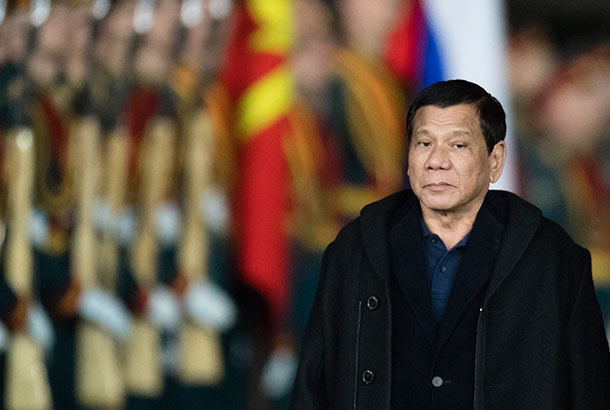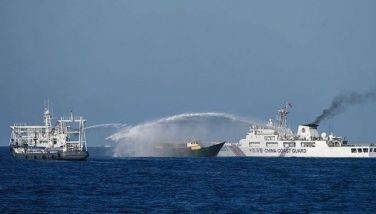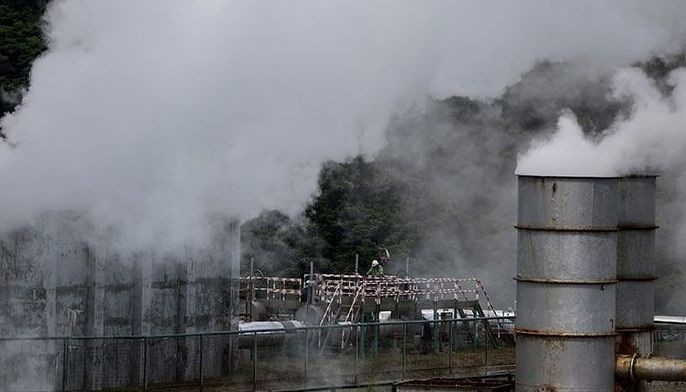MANILA, Philippines (Updated May 24, 12:23 a.m.) — President Rodrigo Duterte declared martial law in Mindanao on Tuesday night in response to clashes in Marawi City that began on Tuesday afternoon.
Presidential Spokesperson Ernesto Abella, in a press conference in Moscow, said that details of martial law will be "forthcoming" and that it covers the whole island of Mindanao and island groups in the region.
"The president has called me and asked me to announce that as of 10 p.m., Manila time, he has already declared martial law for the entire island of Mindanao," he said.
In a statement to reporters after the press conference, Abella added the declaration of martial law was necessary "in order to suppress lawless violence and rebellion and for public safety."
He added "the government is in full control of the situation and is fully aware that the Maute/ISIS (Islamic State of Iraq and Syria) and similar groups have the capability, though limited, to disturb the peace."
Defense Secretary Delfin Lorenzana, who is in Russia with the members of the Cabinet, said the declaration would entail the suspension of writ of habeas corpus, curfews and setting up of checkpoints.
Marawi clashes
Lorenzana, who is in Russia with the president's delegation, said that the fighting in Marawi City started Tuesday afternoon as police and military were moving to serve a warrant of arrest on Abu Sayyaf leader Isnilon Hapilon.
He said that members of the Maute Group occupied parts of Marawi City in response.
"A firefight ensued and our troops reacted properly, but as of tonight, in the Philippines, the Maute group burned several facilities (in the city)," Lorenzana said.
He said that among the structures confirmed to have been set on fire are St. Mary's Church, the city jail,Ninoy Aquino school and Dansalan College. Some houses have also been reported burning.
"Maute fighters still occupy the main street of Marawi City... Quezon Street and two bridges into the city," the Defense secretary also said.
He said that there is no power in the entire city and that there are Maute snipers "all around."
Lorenzana said reinforcements have already been sent to Marawi City, with more troops coming in from Zamboanga City and Manila.
He stressed that the situation in Marawi City is under control and that security forces are only holding position to give reinforcements time to arrive.
He said he believes there was no failure of intelligence in the Marawi sitaution but that there was "lack of appreciation" of information.
He said security forces did not anticipate the number Maute sympathizers that may have helped the militants slip into the city.
Lorenzana added Isnilon had been backed up by around 100 fighters.
The Armed Forces of the Philippines Western Mindanao Command said Tuesday night, before the declaration of martial law was announced, that "our soldiers and policemen continue to conduct mopping up operations to clear Marawi from remnants of the Maute in order to protect our citizens."
Foreign Affairs Secretary Alan Peter Cayetano said at the same press conference that the president will be cutting his visit to Russia short because his presence is needed in the country.
The signing of bilateral agreements with Russia will push through but the meetings with Russia President Vladimir Putin and Prime Minister Dmitry Medvedev were postponed. Cayetano said Duterte may just speak with the two leaders via phone.
Earlier Tuesday evening, National Security Adviser Hermogenes Esperon Jr. said that the president would continue with the trip as planned.
Martial law
Under the 1987 Constitution, the president can declare martial law "in case of invasion or rebellion, when the public safety requires it."
The president must also submit a report to Congress, whether in person or in writing, within 48 hours of the declaration.
If Congress does not agree that martial law should be declared or the writ of habeas corpus suspended, it can "voting jointly, by a vote of at least a majority of all its members in regular or special session" revoke the proclamation or suspension.
No declaration of martial law or the suspension of the writ of habeas corpus can last for more than 60 days unless a majority in Congress, again voting jointly, votes to extend it "if the invasion or rebellion shall persist and public safety requires it."
"A state of martial law does not suspend the operation of the Constitution, nor supplant the functioning of the civil courts or legislative assemblies, nor authorize the conferment of jurisdiction on military courts and agencies over civilians where civil courts are able to function, nor automatically suspend the privilege of the writ," the constitution also says.
The entire Philippines has been under a state of national emergency since the Davao City bombing in September 2016.
The last Philippine president to declare martial law was Gloria Macapagal-Arroyo, who did so in Maguindanao on Dec. 4, 2009 in the aftermath of the Ampatuan massacre.
Martial law in the province was lifted on Dec. 12. 2009. — Jonathan de Santos with reports from Roel Pareño, Alexis Romero and Christina Mendez































